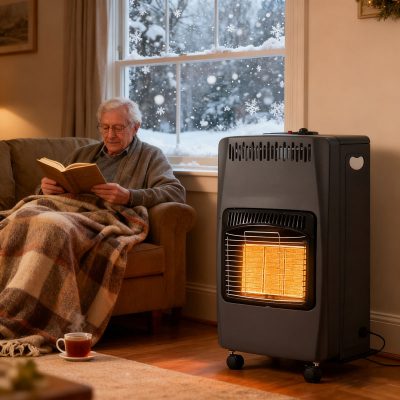It’s that time of the year again—the days grow shorter, the wind bites a little harder, and suddenly that cosy jumper just isn’t enough. Many households across the UK are switching on their gas heaters to keep the chill at bay. But as comforting as that warmth feels, it also comes with an unpleasant side effect: soaring energy bills.
The good news? There are plenty of clever, tried-and-tested ways to make your gas heater work more efficiently without compromising comfort. Whether you live in a small flat or a detached home in the suburbs, these practical tips will help you stay toasty while keeping your heating costs under control.
Understanding How Gas Heaters Work
Before diving into the tips, it’s useful to know what’s going on behind the scenes. Gas heaters—whether portable, wall-mounted, or part of a central heating system—use natural gas or propane to produce heat. They work by burning the gas in a combustion chamber, releasing warm air that circulates around the room or through your home’s ductwork.
Because they provide instant heat and can reach higher temperatures than electric heaters, gas models remain a popular choice across Britain. However, they can also waste energy if not used wisely—especially in older homes where insulation may not be ideal.
1. Don’t Overheat the Room
It’s tempting to crank up the heat when you step inside from the cold, but doing so can cause unnecessary energy waste. Each extra degree on your thermostat can increase your energy bill by roughly 4–5%.
Try setting your thermostat to around 18–20°C—a comfortable range for most people. If you’re feeling chilly, add a blanket or wear thicker socks instead of turning up the heat. Small changes in habit can make a noticeable difference over time.
2. Use a Programmable Thermostat
A smart or programmable thermostat can be your best ally in saving energy. Set it to lower the temperature automatically when you’re out or asleep, and raise it again before you return home.
This way, you’ll never heat an empty house. Many modern systems even allow you to adjust settings remotely via smartphone—perfect for those unpredictable British weather swings.
3. Zone Your Heating
If you live in a larger house, there’s no need to keep every room at the same temperature. Focus your gas heating where you actually spend time—like the living room or bedroom—and reduce heat in less-used spaces such as hallways or spare rooms.
Some portable gas heaters make this easy. They can be moved to the area that needs warmth most, giving you flexibility and efficiency. Homeowners who use portable gas heater ranges often note that zoning their heat helps them stay warm without burning through extra fuel.
4. Keep Doors and Curtains Closed
One of the simplest (and most overlooked) tricks for conserving heat is to trap it where you need it.
- Close doors between rooms to stop warm air from escaping.
- Use thick, lined curtains to reduce heat loss through windows, especially single-glazed ones.
- Open your curtains during the day to let natural sunlight in, then close them at dusk to keep the warmth inside.
This traditional approach still works wonders, particularly in Britain’s older houses that tend to have draughts and thin walls.
5. Check for Draughts
Speaking of draughts, even small gaps around windows, doors, and skirting boards can let cold air seep in and drive your heating system into overdrive.
Spend an afternoon inspecting your home for leaks. Use draught excluders, self-adhesive foam strips, or even a rolled-up towel at the bottom of the door if you’re on a budget.
Stopping draughts can save up to £60 a year on heating bills, according to UK energy-saving experts.
6. Maintain Your Gas Heater Regularly
A well-maintained gas heater is not only safer but also more energy-efficient. Over time, dust and carbon deposits can build up, reducing heat output and increasing fuel use.
Here’s what you can do:
- Clean vents and filters regularly to ensure good airflow.
- Check pilot lights and ignition systems for steady operation.
- Have your appliance serviced by a Gas Safe registered engineer at least once a year.
A properly tuned heater burns cleaner and distributes warmth more evenly—saving both energy and money.
7. Add Layers to Your Living Space
You can improve comfort without relying solely on the heater. Consider these small but effective additions:
- Rugs on bare floors prevent heat from escaping through tiles or wooden boards.
- Throws and blankets keep you cosy during TV time.
- Thermal curtains act as extra insulation, especially in draughty rooms.
Sometimes, comfort is about the environment as much as the temperature.
8. Combine Heating with Ventilation Wisely
It’s important to ventilate your home in winter to avoid condensation and mould, but there’s a balance to strike.
Open windows briefly once or twice a day—preferably when the heater is off—to refresh the air. Avoid leaving them open for long periods. This “quick burst” method replaces stale air without letting all your warmth escape.
9. Use Reflective Panels Behind Radiators
If your heating setup includes radiators powered by gas, install foil or reflective panels behind them. These reflect heat into the room instead of letting it seep into the wall.
It’s an inexpensive and simple DIY fix that can improve efficiency, especially for radiators on external walls.
10. Consider Supplemental Heating
If you spend most of your time in one room, it might make sense to use a smaller, energy-efficient portable heater instead of running the central gas system all day.
For example, Home Pet Essentials offers compact heating solutions ideal for small spaces, pet areas, or home offices. They’re designed to complement your main heater, giving you targeted warmth where you need it most—without inflating your gas bill.
11. Time Your Heating Smartly
Many people run their gas heaters continuously, thinking it saves energy in the long run—but that’s not necessarily true. It’s generally more efficient to heat the room just before you need it rather than keeping it warm all day.
For example, schedule your heating to come on 30 minutes before you wake up or return home. Once you’re comfortable, lower the setting slightly; the residual warmth will linger longer than you might expect.
12. Upgrade to an Energy-Efficient Model
If your gas heater is more than ten years old, it might be time to replace it. Newer models are designed with improved combustion technology and automatic temperature control, which can reduce gas consumption by up to 20%.
When choosing a new unit, look for:
- High energy efficiency ratings (A or above)
- Adjustable thermostat and safety cut-off features
- Low-emission burners
Although the upfront cost is higher, the long-term savings on fuel and maintenance make it well worth the investment.
A Few Final Thoughts
Heating your home during the British winter doesn’t have to mean dreading the next gas bill. With a few mindful adjustments and regular maintenance, you can make your heater work smarter—not harder.
Small habits—like closing curtains early, zoning your heat, or using portable solutions from Home Pet Essentials—can collectively lead to significant savings over the season.
Remember, efficiency isn’t about sacrifice; it’s about comfort that lasts longer and costs less. So, this winter, stay warm, save energy, and make your home the cosiest place to be—without burning through your budget.



